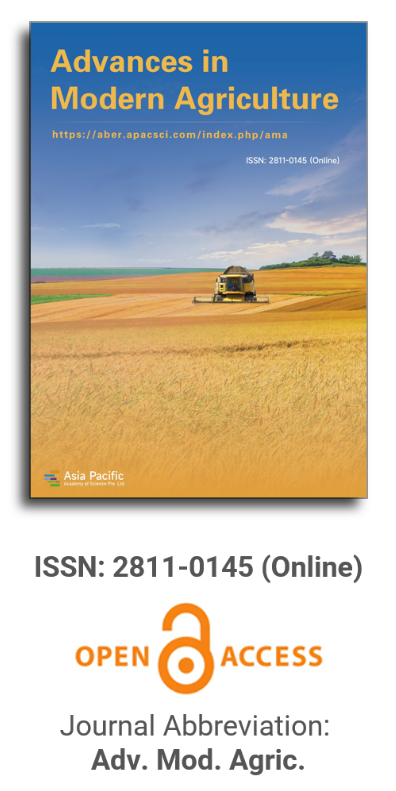


Analysis of the energy management in the company irrigation elements for agriculture
Vol 3, Issue 1, 2022
VIEWS - 6276 (Abstract)
Download PDF
Abstract
This paper analyzes the necessary linkage that must exist between the behavior of energy management in the industries destined to produce elements for agricultural productions, in this case, part of the components of irrigation systems for agriculture, important systems to ensure favorable results in the characteristic crops of each season of the year, whether or not they are short cycle. The behavior of the energetic expense is fundamentally analyzed, mainly of the electric system and the support energetic systems that determine the conformation of the productions destined for the irrigation systems. Proposals are made that can contribute to diminishing the production costs in the productive entity and that can contribute to a decrease in the cost of obtaining the agricultural product.
Keywords
References
- Avella CJC, Caicedo POF, Oqueña QEC, et al. The MGIE, an energy management model for the national productive sector (Spanish). El Hombre y la Máquina 2008; 30: 18–31.
- Soto CJ, Borroto NAE, González AR, et al. Design and implementation of a procedure for energy planning according to NC-ISO 50001: 2011 (Spanish). Ingeniería Energética 2014; 35(1): 38–47.
- Ministry of Energy and Mines. NC-800- 2017: Cuban Electrotechnical Committee-Cuban Electrotechnical Regulation (Spanish). Ministry of Energy and Mines; 2017.
- Borroto Nordelo AE (editor). Business Energy Management (Spanish). Universidad de Cienfuegos; 2002.
- Funes MR. Agriculture with a Future: The Agroecological Alternative for Cuba (Spanish). Estación Experimental Indio Hatuey; 2009.
- Palencia OG. Modern Industrial Maintenance Management. Fundamental Principles (Spanish). Ediciones de la U; 2011.
- Ministry of GOC. CUBA-MGOC: Resolution No. 116/2017Ministry of GOC-2017-574-EX42. Ministry of GOC; 2017.
- ISO, CIE. Lighting of indoor workplaces (ISO 8995:2002/CIE S 008-2001, IDT) (Spanish). Available online: https://ftp.isdi.co.cu/Biblioteca/BIBLIOTECA%20UNIVERSITARIA%20DEL%20ISDI/COLECCION%20DIGITAL%20DE%20NORMAS%20CUBANAS/2003/NC%20ISO%208995%20%20a2003%2032p%20tqw.pdf (accessed on 6 July 2020).
- Funes-Monzote FR, Mart GJ, Suárez J, et al. Initial evaluation of integrated systems for food and energy production in Cuba. Pastos y Forrajes 2011; 34(4): 445–462.
- Alpi FG. Improvement of the Electrical Network in the Empresa Pesquera Industrial de La Coloma. Empresa Pesquera Industrial de La Coloma; 2013.
- Arguelles SR. Incidence of Irrigation Scheduling for Saving Water, Electric Energy and Potato Crop Yields in the UBPC-3,” Jesús Menéndez”. UBPC-3; 2014.
- Smith FA, Martínez PF. More Elements about Inspection and Diagnosis in Maintenance Management (Spanish). Universidad Tecnológica de La Habana José Antonio Echeverría; 2018.
- Ministry of Finance Prices. CUBA- M F P: Resolution 277 Electricity Tariffs, no. P1-1-107. P1-1-107. Ministry of Finance Prices; 2014.
- González SE, Miño VJ, Concepción TDN. The role of international collaboration and university-business linkage in the completion of scientific results. University and Society 2017; 9(3).
- Castilla CN, Blanca GV, Martínez AA, Pastor VRM. Software Dialux 4.11. Departamento Construcciones -Arquitectónicas, Center: E.T.S.; 2011.
Supporting Agencies
Copyright (c) 2022 María Rosa Perellada Gamio, Mercedes de la Caridad Albelo Martínez

This work is licensed under a Creative Commons Attribution 4.0 International License.

This site is licensed under a Creative Commons Attribution 4.0 International License (CC BY 4.0).

Prof. Zhengjun Qiu
Zhejiang University, China

Cheng Sun
Academician of World Academy of Productivity Science; Executive Chairman, World Confederation of Productivity Science China Chapter, China
Indexing & Archiving
In the realm of modern agriculture, the integration of cutting-edge technologies is revolutionizing the way we approach sustainable farming practices. A recent study published in Advances in Modern Agriculture titled "Classification of cotton water stress using convolutional neural networks and UAV-based RGB imagery" has garnered significant attention for its innovative approach to precision irrigation management. Conducted by researchers from Institute of Data Science and the AgriLife Research and Extension Center of Texas A&M University (authors's information is below). This study introduces a novel method for classifying cotton water stress using unmanned aerial vehicles (UAVs) and convolutional neural networks (CNNs), offering a powerful solution for optimizing water use in agriculture.
Modern agricultural technology is evolving rapidly, with scientists collaborating with leading agricultural enterprises to develop intelligent management practices. These practices utilize advanced systems that provide tailored fertilization and treatment options for large-scale land management.
This journal values human initiative and intelligence, and the employment of AI technologies to write papers that replace the human mind is expressly prohibited. When there is a suspicious submission that uses AI tools to quickly piece together and generate research results, the editorial board of the journal will reject the article, and all journals under the publisher's umbrella will prohibit all authors from submitting their articles.
Readers and authors are asked to exercise caution and strictly adhere to the journal's policy regarding the usage of Artificial Intelligence Generated Content (AIGC) tools.
Asia Pacific Academy of Science Pte. Ltd. (APACSCI) specializes in international journal publishing. APACSCI adopts the open access publishing model and provides an important communication bridge for academic groups whose interest fields include engineering, technology, medicine, computer, mathematics, agriculture and forestry, and environment.



.jpg)
.jpg)

.jpg)
